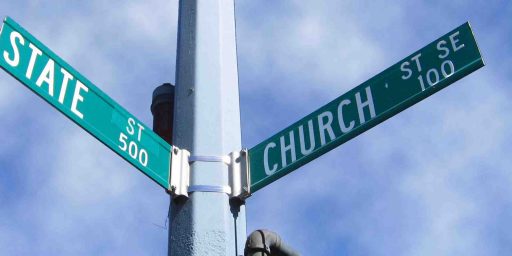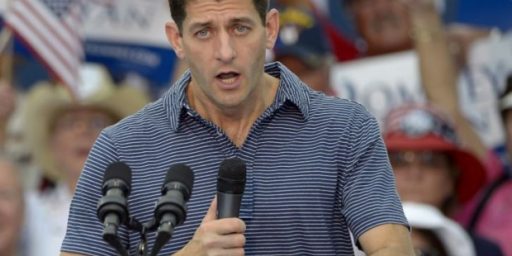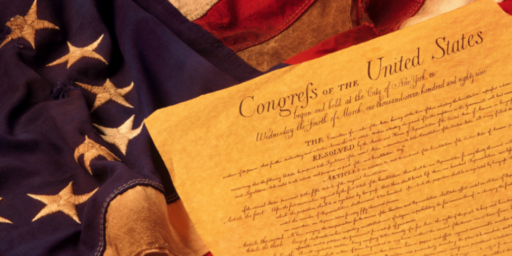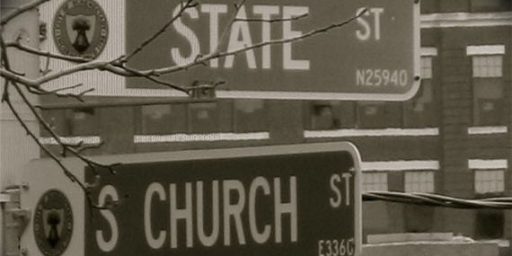INCORPORATION
I missed Brett Marston‘s comments Monday on my earlier post defending Roy Moore’s view of the 1st Amendment. Brett rightly issues a correction:
the Court began applying the Establishment Clause to the states in the late 1940s, not the 1960s as Jim claims.
This is true–Emerson v. BOE (1947). Going from memory, I was thinking Engel v. Vitale (1962), the famous school prayer case, was the initiator of this trend. I only had to refer to my old class outline to verify this!
Still, my argument remains: The 1st Amendment went into effect in 1791. States had established churches as late as 1818. In 1833, SCOTUS ruled that the Bill of Rights only applied to the feds. It wasn’t until the 1925 case of Gitlow v NY that the Supremes created what has become known as the Incorporation Doctrine, selectively applying the Bill of Rights against the states via the 14th Amendment, the relevant portion of which reads:
“No State shall make or enforce any law which shall abridge the privileges or immunities of citizens of the US; nor shall any State deprive any person of life, liberty, or property without due process of law; nor deny to any person within its jurisdiction the equal protection of the laws.”
The 14th Amendment was ratified in 1868. So, it took 57 years to come up with this rather bizarre interpretation.
Further, it took another 22 years to apply this doctrine to the Establishment Clause, meaning 79 years after the ratification of the 14th Amendment and a whopping 157 years since the passage of the 1st Amendment!
And, of course, I agree with Brett when he writes,
It is one thing to say that text and history can be read in such a way as to develop a theory of the Establishment Clause that limits its reach to the establishment of a national church, and quite another thing to say that it would be a great idea to allow states to establish churches.
I think it’s a horrible idea. Indeed, had the Incorporation Doctrine never been invented and a state in which I resided suddenly established a church, I’d strongly consider moving. But, while it’s one thing to say established churches–or, more likely, states paying minor ceremonial nods to the religion of the vast majority of its citizens–are a bad idea, it’s quite another saying that a reading of the actual Constitution gives the courts the power to stop it.
We live, theoretically at least, in a federal Republic. Alabama is one of the most religious states in the union. I can report from personal experience that, as late as 1984, Alabama was doing “a moment of silent prayer” in the schools. (Although, to be fair, we did “the Lord’s Prayer,” which was read over the intercom, in the public schools in Houston, Texas when I was in grade school in the early 1970s–well after Engel v. Vitale.) As late as 2002, we routinely had administration-led prayers at mandatory events and meetings at the state-supported university of which I was a faculty member. Clearly in violation of a host of Supreme Court decisions. I found it outrageous. But the vast majority of Alabamians want that kind of lifestyle. I’m not sure they shouldn’t be allowed to have it. Certainly, no reasonable reading of the 1st Amendment (“CONGRESS shall make no law. . .”) precludes it.
Update (16:48): Kevin Drum writes on this issue here and responds to me in his comments section.






Thanks for the response, Jim! I thought that standard history is that the 5th Amendment protections against taking property without due process were incorporated in the late 19th century. And there is a lot of evidence that many framers of the Amendment thought that the 14th Amendment did in fact incorporate the Bill of Rights. It’s not a consensus position, to be sure. But it seems to me that there’s enough indeterminacy there to allow the assertion of judicial power. And think of the recent Free Exercise cases that concerned congressional actions such as the Religious Freedom Restoration Act and RLUIPA. Members of Congress sure seem to want incorporation when it suits them. Makes sense for a variety of reasons, including the fact that it’s settled law. But I fundamentally agree with the approach that locates a possible attack on incorporation, even though I think it’s a theoretically undesirable interpretation and thus shouldn’t command my allegiance!
—